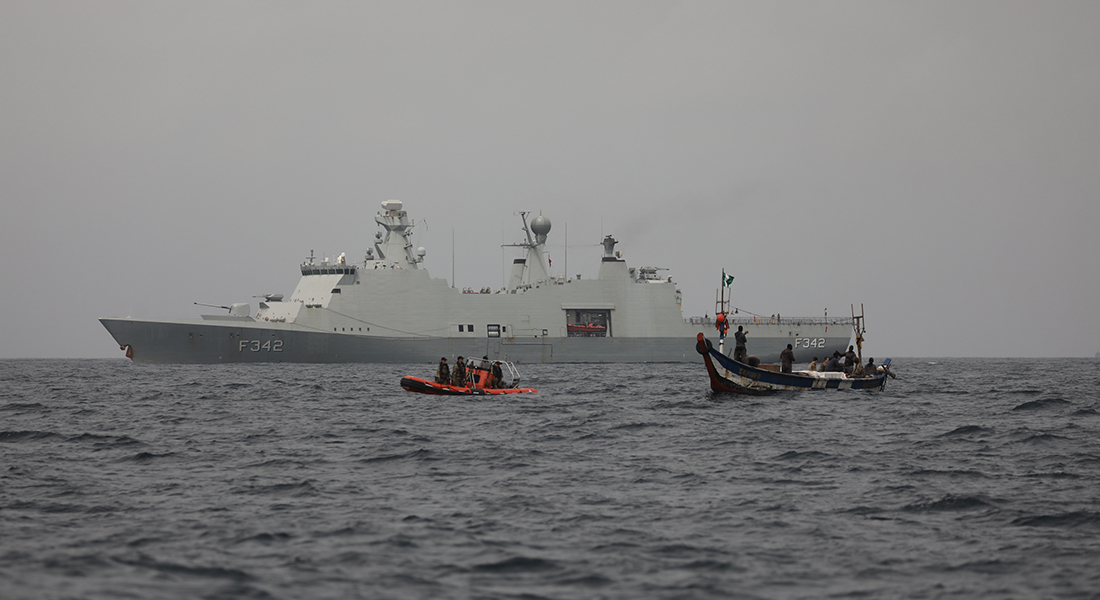Despite many years of effort: Pirates still lurk in the Gulf of Guinea
Despite a period of historically low levels of pirate attacks, the UN – and other actors – continue to develop strategies to counter pirate groups in the Gulf of Guinea. Some of the UN’s strategies and resolutions are based on a report with Katja Lindskov Jacobsen, senior researcher at the Department of Political Science, as the lead-author.

The Gulf of Guinea in West Africa is one of the regions in the world which is most affected by maritime crime, including piracy. In the first half of 2018, over 40 percent of all reported piracy attacks worldwide took place in the Gulf of Guinea. Nigerian waters alone accounted for 29 percent of the world's piracy attacks during this period.
Since then, international military efforts – with Danish participation – has contributed to reducing the levels of piracy attacks in the Gulf of Guinea. Yet, as stated at the policy forum ‘G7 ++ Friends of the Gulf of Guinea’ this summer: piracy in the Gulf of Guinea is still a challenge to be aware of.
Based on Danish research
The UN Security Council also keeps a close eye on the security situation in the Gulf of Guinea. On 31 May, the Council unanimously adopted a text (Resolution 2634) calling on Member States in the Gulf of Guinea to criminalize piracy and armed robbery at sea under their national laws. At the same time, states are encouraged to investigate, prosecute or extradite both the perpetrators and those who encourage, finance or knowingly facilitate the crimes.
The Security Council Resolution is based on two scientific reports. One, "Pirates of the Niger Delta", has Katja Lindskov Jacobsen, senior researcher at the Department of Political Science, as the main author. Katja Lindskov Jacobsen is happy that the UN Security Council makes use of her research in the continued fight against piracy in the Gulf of Guinea.
”Particularly two findings from the report, were also highlighted at a UN debate last year. One is, that it is relatively few groups that are able to carry out what we refer to as Deep Offshore piracy attacks. Between four and six groups. Another is that it is not a type of crime from which pirate groups and their sponsors make huge amounts of money. In 2020, kidnap-for-ransom piracy in the Gulf of Guinea brought in approximately 4 million US$ in ransom money,” says Katja Lindskov Jacobsen, who works at the Center for Military Studies.
Calls for regional prosecution
The UN Security Council calls on the member states in the Gulf of Guinea to develop and implement national maritime security strategies.
”The Gulf of Guinea covers a large area. Maritime security strategies and security agencies’ presence at sea is important across all coastal states as we have seen in the past that pirate groups quickly shift their activity to those place in the region where there is the least focus on preventing and combating piracy at sea. If some countries intervene while others do not, there is a risk that piracy will move to the places with the least focus on combating piracy,” explains Katja Lindskov Jacobsen.
The Security Council also aims to harmonize the legal framework for the prosecution of persons involved in piracy.
”Denmark follows this work closely. It is important for many reasons, including the possibility of being able to hand over detained piracy suspects for prosecution to states in the region,” highlights Katja Lindskov Jacobsen.
Earlier this year, the Danish state had to drop the charges against three suspected pirates that the frigate Esbern Snare had on board. In this connection. Former Minister of Justice Nick Hækkerup expressed at that time a desire for a model where suspected pirates, arrested by e.g. Denmark, can be prosecuted in the region.
Remember the underlying causes
Finally, the UN Security Council emphasizes that comprehensive efforts are needed to prevent piracy and tackle the underlying causes. An effort that must take place in cooperation between the international community and the states of the Gulf of Guinea, regional organizations and other relevant parties.
”It requires extensive efforts to avoid that people involved in piracy at different levels do not simply switch from one type of crime to another. Here, our description of a typical pirate group structure is relevant. Counterpiracy efforts should not only focus on the relatively few people that go out to sea to kidnap seafarers from international ships,” says Katja Lindskov Jacobsen.
Among other relevant levels in the structure, she mentions the sponsors who enable the pirate attacks by sponsoring large engines, speedboats, petrol and other things.
”In addition, a number of people are involved at a lower level, guarding hostages or cooking for them. The entire structure must be considered in a forward-looking, comprehensive preventive effort. Unlike deterrence, this effort cannot be done from sea – it must take place on land. There are major challenges to consider, notably widespread unemployment, poverty and pollution, but also various factors that make it possible for the sponsors to operate,” says Katja Lindskov Jacobsen.
Read the report ”Pirates of the Niger Delta” here.
